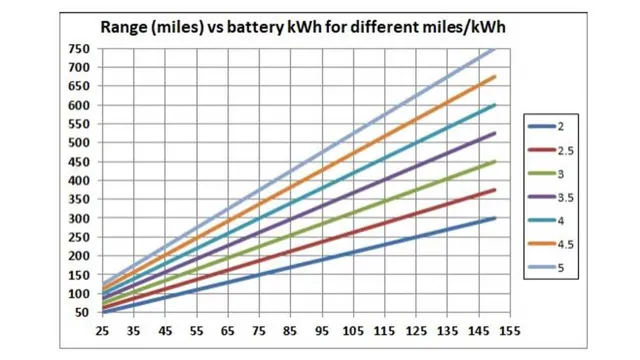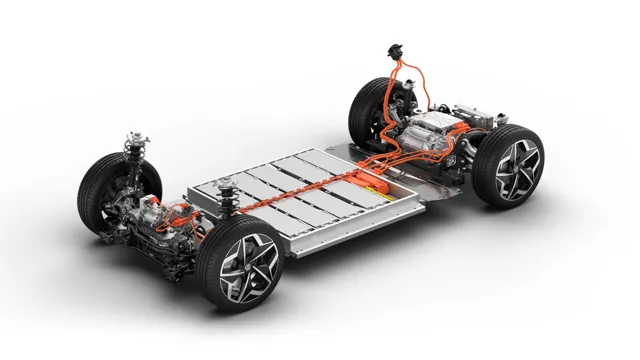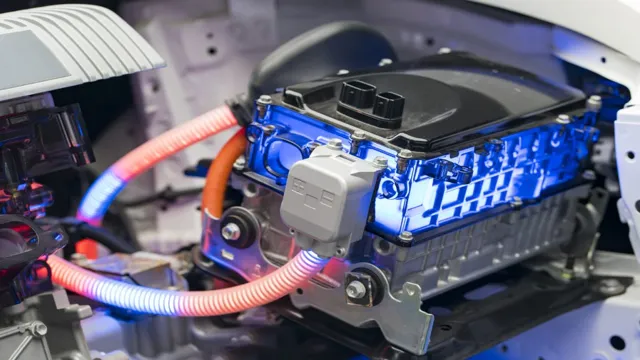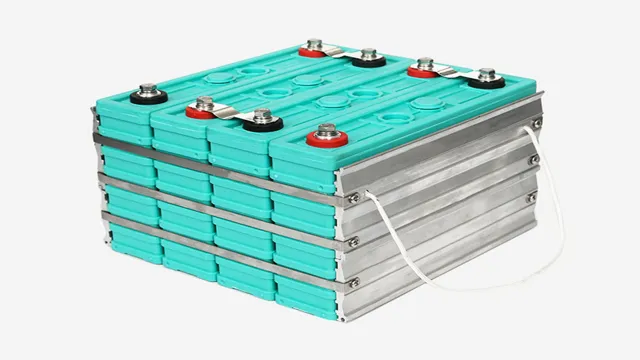Uncovering the Truth: How Battery Capacity Determines the Driving Range of Your Electric Car
Electric cars have been around for a while now, and they are quickly becoming more popular. One of the main concerns with electric vehicles (EVs) is the battery capacity. What is the battery capacity of an EV? How does it affect the range of the vehicle? These are all important questions that anyone thinking of buying an EV should be asking.
In this comprehensive guide, we will be answering all of your questions about electric car battery capacity. We will explore the different types of batteries, how they work, and how to extend their lifespan. So, buckle up and let’s dive into the world of EV batteries!
Understanding Battery Capacity
Battery capacity of electric cars is an essential factor in the electric vehicle’s overall performance. It is the amount of electrical energy the battery can store and provide to the motor. Battery capacity is measured in kilowatt-hours (kWh), and it directly affects the car’s range.
The higher the battery capacity, the longer the car can travel before it needs to be recharged. Thus, battery capacity plays a crucial role in determining the electric car’s marketability. However, it’s important to note that battery capacity is just one factor that influences a vehicle’s performance.
Other parameters such as the motor’s efficiency, aerodynamics, and weight also contribute to a car’s range. As the electric car market continues to grow, battery technology continues to improve, and we see more and more cars on the road with longer ranges. It’s exciting to see the development in this field, and by choosing a high-capacity battery, we can drive farther and faster, making electric cars even more appealing.
What is Battery Capacity?
Battery capacity is a term used to describe the amount of energy a battery can store and provide at a given time. It is usually measured in ampere-hours (AH) or milliampere-hours (mAh), and the higher the number, the more power the battery is capable of storing. Think of it like a container that holds water, the larger the container, the more water it can store.
Similarly, the larger the battery capacity, the more power it can hold. However, it’s important to note that the battery’s capacity doesn’t necessarily determine its performance, as factors like the quality of the battery and the device it’s used in can also affect its efficiency. Additionally, different types of batteries have varied capacity levels, with lithium-ion batteries being the most commonly used in electronics due to their high energy density.
Understanding the battery capacity of your device and how it affects its overall performance is important when deciding which battery is best for your needs.

How is Battery Capacity Measured?
Battery capacity is the measure of a battery’s ability to store and release electrical energy. Basically, it is a measure of how much energy a battery can provide in a single discharge. The unit used to measure battery capacity is called “ampere-hour” or simply “Ah”.
It indicates the amount of current a battery can supply for one hour. For example, a 5 Ah battery can deliver a current of 5 amps for one hour. The battery’s capacity tells you how long it can power a device and is determined by factors like the structural design, materials used, and manufacturing process.
Battery capacity is a crucial consideration when choosing batteries for various applications, ranging from small devices like smartphones to large batteries used in electric vehicles. So, understanding how battery capacity is measured can help you choose the right battery for your needs.
Factors Affecting Battery Capacity
Understanding battery capacity is essential for maximizing the life of your devices. Battery capacity refers to the amount of energy that a battery can store and supply to an electronic device. Several factors affect the battery’s capacity, including the type of battery, temperature, and usage.
Each battery type has a different capacity, and it’s essential to know your device’s battery type to get the most out of it. Among the common types are lithium-ion, nickel-cadmium, and lead-acid batteries. High temperatures can reduce battery capacity, so it’s best to avoid exposing batteries to extreme heat.
On the other hand, usage affects battery capacity, and heavy usage can cause batteries to lose capacity faster. It’s essential to use your device in a way that conserves battery life, like reducing screen brightness and disabling unnecessary features. Understanding these factors can help you prolong the life of your battery and ensure that your devices always have power when you need them.
Electric Car Battery Capacity Comparison
Battery capacity is a vital factor to consider when purchasing an electric vehicle. The amount of energy a battery can store and how it is used can determine the car’s range and performance. Some electric cars come with larger batteries than others, providing longer ranges and better performance.
The Tesla Model S currently holds the record for being the electric car with the highest battery capacity available in the market, boasting a range of 402 miles. However, there are other electric cars, such as the Chevrolet Bolt and the Hyundai Kona Electric, that offer excellent ranges, with battery capacities of 66 and 64 kilowatt-hours, respectively. Smaller electric cars, such as the Nissan Leaf and the BMW i3, have battery capacities that range between 40-50 kWh but offer shorter ranges.
When considering purchasing an electric vehicle, it’s essential to determine how much driving you’ll be doing and choose a vehicle with the appropriate battery capacity to suit your needs.
Top 5 Electric Cars with the Best Battery Capacity
Electric car battery capacity comparison If you’re in the market for an electric car, one of the most important factors to consider is battery capacity. After all, the larger the battery, the longer the car can drive on a single charge. In this article, we’ll take a look at the top 5 electric cars with the best battery capacity.
First on our list is the Tesla Model S Long Range, which boasts a battery capacity of 100 kilowatt-hours (kWh) and a range of 402 miles. Next up is the Lucid Air Dream Edition, with a 113 kWh battery and a range of 517 miles. The Porsche Taycan Turbo S comes in at number three, with a 9
4 kWh battery and a range of 200 miles. Fourth on our list is the Audi e-tron, with a 95 kWh battery and a range of 222 miles. And finally, we have the Ford Mustang Mach-E GT, with an 88 kWh battery and a range of 270 miles.
When deciding on an electric car, be sure to choose one with a battery capacity that suits your driving needs.
Top 5 Electric Cars with the Worst Battery Capacity
Electric car battery capacity is a critical factor that has a significant impact on the performance and range of electric vehicles. While electric cars have seen tremendous advancements in technology, some models still fall short on battery capacity. In this article, we’ve compiled a list of the top five electric cars with the worst battery capacity.
Starting off the list is the Smart EQ Fortwo, which has a battery capacity of just 16 kWh. Next up is the Mitsubishi i-MiEV, with a battery capacity of 16 kWh.
The Ford Focus Electric takes the third spot with a battery capacity of 35 kWh, followed by the Nissan Leaf with a battery capacity of 40 kWh. Finally, the BMW i3 rounds out the list with a battery capacity of 4
2 kWh. While these electric cars may fall short when it comes to battery capacity, they still offer several benefits such as being eco-friendly and cost-effective. However, if you’re looking for an electric car with an impressive battery capacity, it’s best to keep an eye out for models like the Tesla Model S, which boasts a battery capacity of up to 100 kWh.
Battery Capacity vs Driving Range
When it comes to driving an electric car, one of the most important factors to consider is the battery capacity. This is because the battery is what powers the car and determines how far you can drive before needing a recharge. Battery capacity is typically measured in kilowatt-hours (kWh) and can range from around 20 kWh to over 100 kWh in the latest electric car models.
However, it’s important to note that a higher battery capacity does not necessarily mean a longer driving range. Other factors such as the weight and aerodynamics of the car, and driving habits, can also influence how far an electric car can travel on a single charge. In general, electric cars with larger battery capacities will have a longer driving range, but this may not always be the case.
It’s important to do research and compare different electric car models to find one that fits your driving needs and preferences.
The Relationship between Battery Capacity and Driving Range
As electric vehicles are becoming more and more popular, people are curious about the relationship between battery capacity and the driving range of these cars. The truth is that a larger battery capacity usually means a greater driving range. Essentially, the bigger the battery, the longer you can drive your car before needing to recharge it.
Of course, other factors such as driving habits and weather conditions can also affect the driving range, but battery capacity is a significant factor to consider. An analogy would be comparing the gas tank capacity of a traditional gasoline vehicle to battery capacity in an EV. The larger the gas tank, the farther you can go without needing to stop at a gas station.
Similarly, with a larger battery capacity, you can drive further without needing to recharge your electric vehicle. So, when choosing an electric vehicle, it’s important to look at the battery capacity and consider how much driving range you need for your daily use.
How to Optimize your Battery Capacity for Longer Driving Range
When it comes to electric vehicles, the battery capacity is a crucial factor that determines the driving range. However, it’s essential to understand that battery capacity alone doesn’t guarantee longer driving range. There are several steps that drivers can take to optimize their battery’s capacity and increase the driving range.
One of the simplest ways is to maintain a consistent driving speed and avoid sudden acceleration or breaking. This helps to conserve energy and extend the battery’s life. Another effective method is to reduce the use of power-hungry accessories like air conditioning or heating when they are not necessary.
Additionally, keeping the battery cool and avoiding extreme temperatures can also improve its performance and prolong its lifespan. By implementing simple tricks like these, EV drivers can enjoy maximum battery capacity, longer driving range, and a more efficient driving experience.
Future of Electric Car Battery Capacity
As electric cars gain popularity, there has been a growing interest in the technology behind their battery capacity. Improvements in the capability of electric car batteries are a crucial factor in the success of the industry. Many manufacturers are working towards creating batteries that can hold a larger amount of energy and last longer.
Some companies are exploring solid-state batteries as a possible solution, as they offer higher energy density and longer lifespans than the traditional lithium-ion batteries commonly used today. Additionally, research into hybrid battery systems that combine different types of batteries could also lead to increased capacity. While battery technology for electric cars is still relatively new, it’s clear that continued research and development will bring advancements in the future.
We can expect to see longer driving ranges and faster charging times as battery capacity continues to improve. The battery capacity of electric cars is sure to play a major role in the future of the automotive industry and sustainability efforts everywhere.
Advancements in Battery Technology
Electric car batteries have traditionally been a limiting factor in the widespread adoption of electric vehicles. However, advancements in battery technology are paving the way for longer ranges, faster charging times, and increased durability. One promising development in electric car batteries is the use of solid-state batteries.
These batteries have higher energy density, meaning they can store more energy in a smaller space, and are less likely to catch fire. Another advancement in battery technology is the use of silicon anodes, which can increase battery capacity by up to 40%. This means that electric cars will be able to travel farther on a single charge, making them a more practical option for everyday use.
The future of electric car battery capacity is looking bright, and these advancements in battery technology will undoubtedly shape the future of the automotive industry.
Predictions for the Future of Battery Capacity
Electric car battery capacity is set to experience significant advancements in the near future. With multiple companies investing heavily in research and development, battery technology is expected to improve at a rapid pace. One of the most promising advancements is the development of solid-state batteries, which have higher energy densities and can be charged more quickly than traditional lithium-ion batteries.
Additionally, advancements in electrode materials and cell design are also expected to increase the overall capacity and lifespan of electric car batteries. With these advancements, it’s predicted that the range of electric cars will continue to increase while reducing the need for frequent charging. This will make electric cars a more viable option for long-distance traveling and help accelerate the transition towards a greener future.
Environmental Impacts of Increasing Battery Capacity
As the demand for electric cars increases, so does the pressure to increase battery capacity. Many electric car manufacturers are working on developing batteries with higher capacity to improve the range and performance of electric vehicles. However, increasing battery capacity has some environmental impacts.
The production of batteries requires a significant amount of resources, including rare metals like lithium, cobalt, and nickel. Mining these metals can cause environmental damage by degrading natural habitats and releasing toxic chemicals into the environment. Additionally, the process of manufacturing batteries generates CO2 emissions, contributing to climate change.
Despite these concerns, researchers and manufacturers are working on finding ways to reduce the environmental impact of battery production and disposal. Some are exploring the use of alternative materials and recycling methods, while others are improving the efficiency of production processes to reduce waste and emissions. As electric cars become more popular, it is essential to balance the benefits of increased battery capacity with the environmental impact of producing and disposing of these batteries.
Conclusion
In the world of electric cars, battery capacity is like the engine of a traditional car – it’s the heart and soul of the vehicle. With battery technology constantly improving and charging infrastructure expanding, the range anxiety that once plagued electric car owners is quickly becoming a thing of the past. It’s no longer a question of whether electric cars can go the distance – it’s a matter of when they will fully take over the roads.
So if you’re considering going electric, don’t worry about the battery – just sit back, relax, and enjoy the ride!”
FAQs
What is the average battery capacity of an electric car?
The average battery capacity of an electric car is around 60-100 kWh.
How does the battery capacity affect the range of an electric car?
The battery capacity is directly proportional to the range of an electric car. A higher battery capacity means a higher range.
How long does it take to fully charge the battery of an electric car?
The time taken to fully charge the battery of an electric car varies depending on the charging method and battery capacity. On average, it takes around 8-12 hours to fully charge a 60 kWh battery using a Level 2 charger.
Can the battery capacity of an electric car be increased?
While it is not possible to increase the battery capacity of an electric car, it is possible to upgrade the battery to a higher capacity in some models. However, this can be expensive and may require a trained technician.





